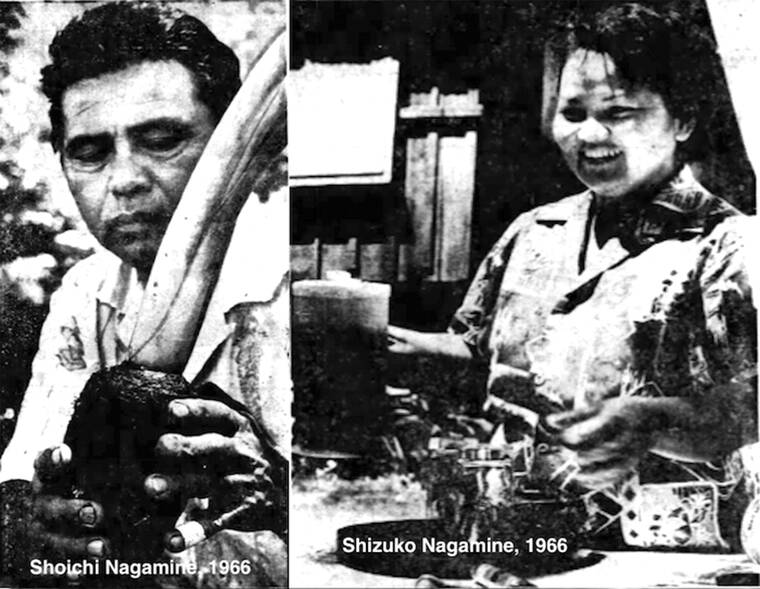For 36 years, until 1985, when they retired from taro farming, Shoichi Nagamine (1920-2001) and his wife, Shizuko Nagamine (1924-2008), raised taro on their 12-acre farm in Hanapepe Valley.
Eight acres were leased from the state of Hawai‘i, 1.5 acres from McBryde Sugar Co., and 2.5 acres from Gay &Robinson.
Yearly leases cost them $320 in 1966.
Their taro was planted on about 6 acres, while their tin-roofed house on stilts, chicken and livestock pens, and vegetable garden occupied the rest of their property.
The Nagamine taro farm also accommodated their three sons: Nathan, Brian and Dale Nagamine, as well as 30 pigs, assorted cats, chickens, dogs and other animals.
Shoichi Nagamine started each 16-hour work day at daybreak.
On Mondays and Tuesdays he harvested taro, which was ready for harvesting in 10 to 13 months after planting depending on the weather.
He did so by pulling it by hand from its roots, and cutting and bagging it for shipment to Honolulu for processing into poi and taro chips.
He shipped 24 bags each week, with each bag weighing 100 pounds and selling for about $6 per bag wholesale (in 1966).
On other days, he weeded his paddies and field banks, planted seedlings, or plowed with a horse originally, and later, a tractor.
He controlled the flow of irrigation water from the nearby Hanapepe River by stuffing culverts with burlap bags.
Nagamine had started off in the carpentry trade but quit, he said, because “I didn’t like climbing high buildings.”
So, he became a farmer by first obtaining a $3,000 startup loan from the Farmers Home Administration.
Wife Shizuko worked alongside him.
“She’s a farm girl. Her folks ran a truck farm in Waikapu, Maui. Yes, she’s a farm girl. That’s why she’s still with me. This life isn’t easy,” he said.
In 1985, the Nagamines retired as taro farmers and began making taro chips in Hanapepe at their Taro Ko Chip Factory.
Son Dale Nagamine took over their business in 2008, and still grows Taro Ko’s taro on a smaller, 6-acre farm in Hanapepe.


